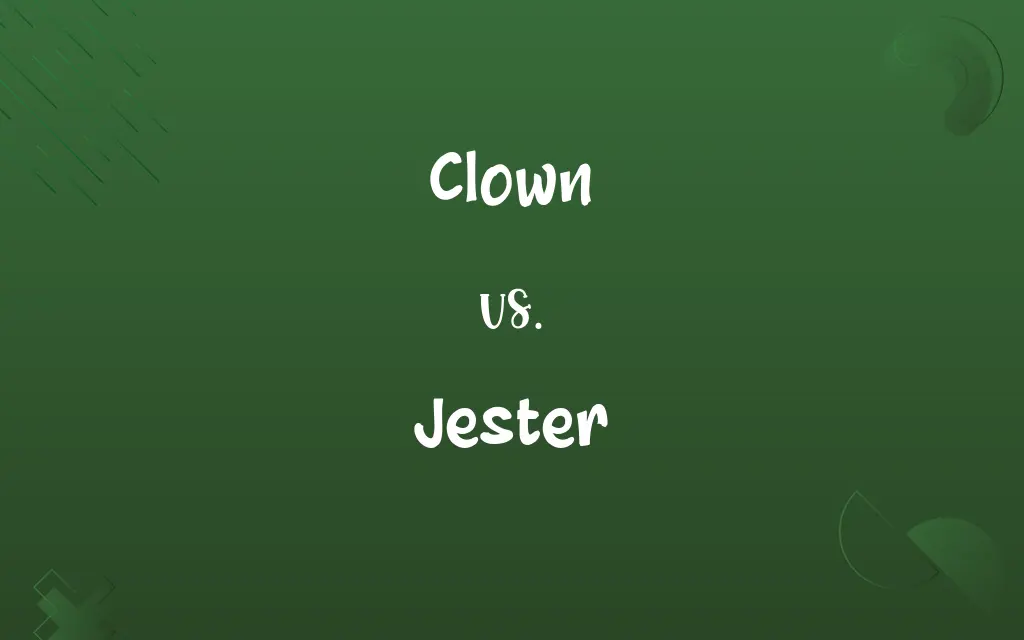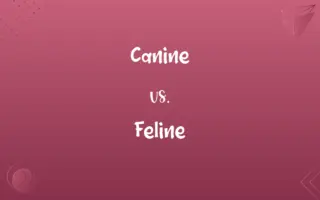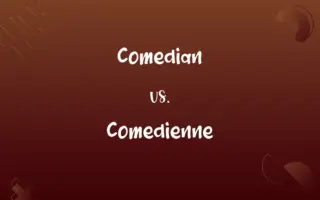Clown vs. Jester: Know the Difference

By Shumaila Saeed || Updated on December 25, 2023
Clowns are comic performers using exaggerated actions and outfits, often in circuses; jesters are historical entertainers in courts, known for satire and wit.

Key Differences
Clowns are primarily associated with circuses and children's entertainment, showcasing exaggerated physical comedy and colorful costumes. Jesters, on the other hand, were historical figures in royal courts, using their wit and humor to entertain and sometimes advise royalty, often wearing distinctive, colorful, and eccentric clothing.
Shumaila Saeed
Nov 13, 2023
The role of a clown is to invoke laughter through slapstick, physical humor, and sometimes absurdity, often in a non-verbal manner. Jesters were expected to be verbally clever and insightful, often using their position to speak truths under the guise of comedy, which others in the court could not.
Shumaila Saeed
Nov 13, 2023
Clowns, as part of modern entertainment, often perform scripted routines and are seen in various media including movies and television. Jesters were improvisational, their art rooted in the medieval and Renaissance eras, often using music, storytelling, and jests to entertain.
Shumaila Saeed
Nov 13, 2023
Clowns can be seen in various settings beyond circuses, like parties or parades, and their acts are generally light-hearted and non-controversial. Jesters, in contrast, were often expected to push boundaries, using satire and humor to reflect on political and social issues of their time.
Shumaila Saeed
Nov 13, 2023
The modern perception of clowns varies, sometimes being associated with fear or unease, a concept popularized by media. Jesters hold a more historical and romanticized image, often associated with intelligence, wit, and the subtle art of satire.
Shumaila Saeed
Nov 13, 2023
ADVERTISEMENT
Comparison Chart
Era
Modern times, especially popular in the 19th-20th centuries
Medieval and Renaissance eras
Shumaila Saeed
Nov 13, 2023
Performance Style
Scripted, exaggerated physical humor
Improvisational, clever wordplay
Shumaila Saeed
Nov 13, 2023
Cultural Perception
Often light-hearted, sometimes feared
Seen as witty, intelligent, historically romanticized
Shumaila Saeed
Nov 13, 2023
ADVERTISEMENT
Clown and Jester Definitions
Clown
A person skilled in making people laugh, usually by behaving in a comical way.
The class clown always knew how to lighten the mood.
Shumaila Saeed
Nov 13, 2023
Jester
Someone who uses humor or sarcasm to critique or make light of authority.
He played the role of a jester, mocking the absurdity of political situations.
Shumaila Saeed
Nov 13, 2023
Clown
A performer in a circus known for humorous acts.
The clown juggled skillfully, making the children laugh.
Shumaila Saeed
Nov 13, 2023
Jester
A symbolic figure representing wit, often adorned in colorful and eccentric costumes.
In the medieval festival, the jester was a central figure, bringing laughter and joy.
Shumaila Saeed
Nov 13, 2023
Clown
Someone who acts in a silly or foolish manner.
Stop being such a clown and take this seriously.
Shumaila Saeed
Nov 13, 2023
ADVERTISEMENT
Jester
A historical entertainer known for wit and humor in a royal court.
The jester's clever jests amused the king and his court.
Shumaila Saeed
Nov 13, 2023
Clown
A comic character in a play or skit.
He played the clown in the school play, eliciting laughter from the audience.
Shumaila Saeed
Nov 13, 2023
Jester
A person who uses wit to entertain, often in a clever or subtle manner.
The jester entertained the guests with his quick-witted puns.
Shumaila Saeed
Nov 13, 2023
Clown
A buffoon or jester who entertains by jokes, antics, and tricks in a circus, play, or other presentation.
Shumaila Saeed
Oct 19, 2023
Jester
A person in colourful garb and fool's cap who amused a medieval and early modern royal or noble court.
Shumaila Saeed
Oct 19, 2023
Jester
Any of various nymphalid butterflies of the Southeast Asian genus Symbrenthia.
Shumaila Saeed
Oct 19, 2023
Jester
A buffoon; a merry-andrew; a court fool.
This . . . was Yorick's skull, the king's jester.
Dressed in the motley garb that jesters wear.
Shumaila Saeed
Oct 19, 2023
Jester
A person addicted to jesting, or to indulgence in light and amusing talk.
He ambled up and downWith shallow jesters.
Shumaila Saeed
Oct 19, 2023
Clown
A slapstick performance artist often associated with a circus and usually characterized by bright, oversized clothing, a red nose, face paint, and a brightly colored wig.
Shumaila Saeed
Oct 19, 2023
Jester
A professional clown employed to entertain a king or nobleman in the middle ages
Shumaila Saeed
Oct 19, 2023
Clown
A person who acts in a silly fashion.
He was regarded as the clown of the school, always playing pranks.
Shumaila Saeed
Oct 19, 2023
Jester
A character in literature or drama who uses clever speech to provide humor.
Shakespeare often used a jester to provide comic relief in his tragedies.
Shumaila Saeed
Nov 13, 2023
Clown
(obsolete) A man of coarse nature and manners; an awkward fellow; an illbred person; a boor.
Shumaila Saeed
Oct 19, 2023
Clown
A man of coarse nature and manners; an awkward fellow; an ill-bred person; a boor.
Shumaila Saeed
Oct 19, 2023
Clown
One who works upon the soil; a rustic; a churl.
The clown, the child of nature, without guile.
Shumaila Saeed
Oct 19, 2023
Clown
The fool or buffoon in a play, circus, etc.
The clown shall make those laugh whose lungs are tickle o'the sere.
Shumaila Saeed
Oct 19, 2023
Clown
To act as a clown; - with it.
Beshrew me, he clowns it properly indeed.
Shumaila Saeed
Oct 19, 2023
Clown
A character in traditional pantomime, often characterized by brightly colored clothes and makeup.
The clown's exaggerated makeup added to the hilarity of his performance.
Shumaila Saeed
Nov 13, 2023
Repeatedly Asked Queries
What is a jester?
A jester was a historical entertainer in royal courts, known for their wit, humor, and often satirical performances.
Shumaila Saeed
Nov 13, 2023
How do clowns and jesters differ in their attire?
Clowns wear exaggerated, colorful costumes and makeup, while jesters historically wore distinctive, bright, and sometimes motley attire.
Shumaila Saeed
Nov 13, 2023
Did jesters have other roles besides entertainment?
Yes, jesters sometimes played a role in advising or critiquing royalty under the guise of humor.
Shumaila Saeed
Nov 13, 2023
Can clowns and jesters be found in modern times?
Clowns are common in modern entertainment, but jesters are more historical figures, though their influence is seen in modern satire.
Shumaila Saeed
Nov 13, 2023
Is there a fear associated with clowns?
Yes, some people experience coulrophobia, or fear of clowns, often influenced by media portrayals.
Shumaila Saeed
Nov 13, 2023
Did jesters only entertain in courts?
Primarily, jesters entertained in royal courts, but they also performed in public settings.
Shumaila Saeed
Nov 13, 2023
What is a clown?
A clown is a comic performer, known for their exaggerated behavior and colorful attire, typically found in circuses or as part of children's entertainment.
Shumaila Saeed
Nov 13, 2023
Are clowns and jesters similar in their roles?
While both aim to entertain through humor, clowns focus more on physical comedy and jesters on verbal wit and satire.
Shumaila Saeed
Nov 13, 2023
Are clowns always part of a circus?
Not always; clowns can be found in various entertainment forms, including parties, parades, and media.
Shumaila Saeed
Nov 13, 2023
Are jesters considered important historical figures?
Jesters are seen as significant for their role in cultural and political commentary in historical contexts.
Shumaila Saeed
Nov 13, 2023
What is the historical significance of jesters?
Jesters hold historical significance for their unique role in critiquing and reflecting societal and political issues in a humorous way.
Shumaila Saeed
Nov 13, 2023
Do clowns have a specific style of humor?
Clowns typically use slapstick and physical humor, appealing to a broad audience.
Shumaila Saeed
Nov 13, 2023
Did jesters have specific skills?
Jesters were skilled in various arts, including music, storytelling, acrobatics, and humor.
Shumaila Saeed
Nov 13, 2023
Can anyone be a clown?
Becoming a clown typically requires training in physical comedy and performance skills.
Shumaila Saeed
Nov 13, 2023
Were jesters always humorous?
While jesters were primarily humorous, they also employed sarcasm and satire, sometimes delivering serious commentary.
Shumaila Saeed
Nov 13, 2023
Do clowns and jesters use verbal humor?
Clowns often rely on physical comedy, whereas jesters were known for their clever and verbal humor.
Shumaila Saeed
Nov 13, 2023
What is the cultural impact of jesters?
Jesters have had a lasting cultural impact, symbolizing the power of humor and wit to challenge authority and societal norms.
Shumaila Saeed
Nov 13, 2023
Is the role of a jester still present in modern society?
The traditional role of a jester no longer exists, but their influence is seen in modern satirical and comedic figures.
Shumaila Saeed
Nov 13, 2023
Are there different types of clowns?
Yes, there are various types of clowns, including the traditional circus clown, character clowns, and more modern interpretations.
Shumaila Saeed
Nov 13, 2023
How are clowns portrayed in media?
Clowns are portrayed in diverse ways, ranging from comedic and friendly to sinister and frightening.
Shumaila Saeed
Nov 13, 2023
Share this page
Link for your blog / website
HTML
Link to share via messenger
About Author
Written by
Shumaila SaeedShumaila Saeed, an expert content creator with 6 years of experience, specializes in distilling complex topics into easily digestible comparisons, shining a light on the nuances that both inform and educate readers with clarity and accuracy.









































































